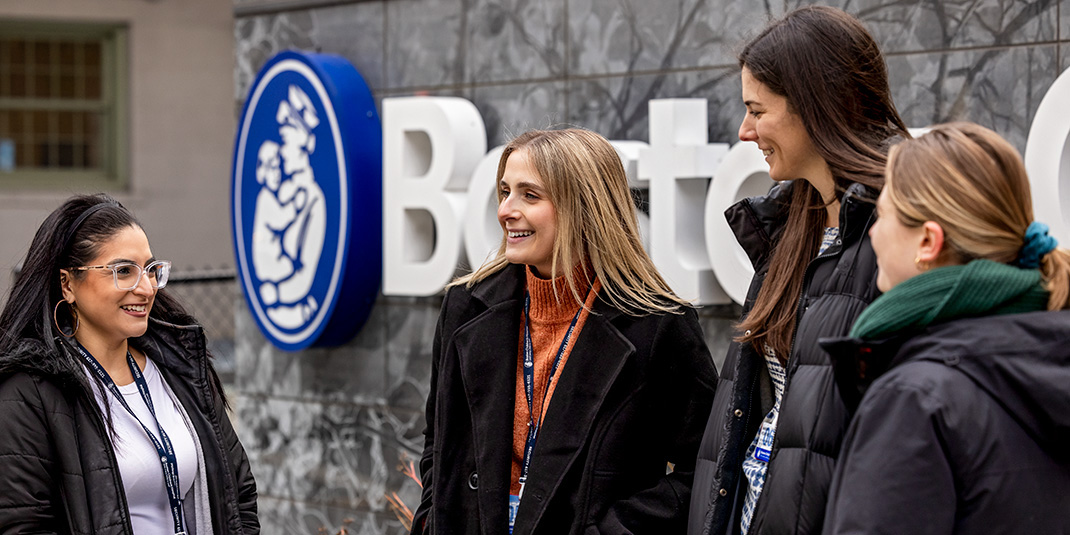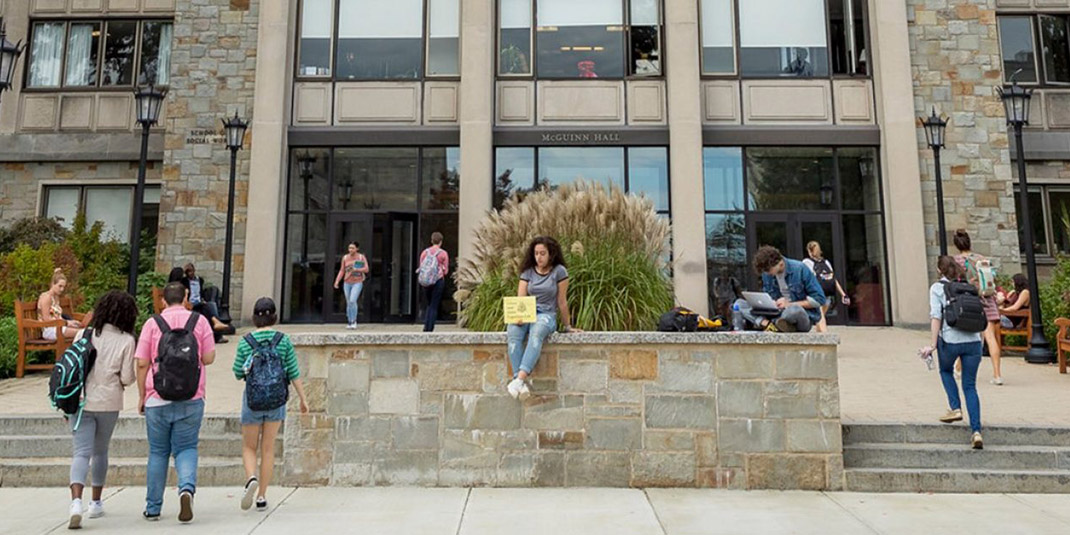
Students walk outside McGuinn Hall, home of the Boston College School of Social Work.
Teresa Schirmer’s office is located on the first floor of McGuinn Hall, directly across from the student lounge at the Boston College School of Social Work.
That’s intentional, says Schirmer, BCSSW’s associate dean of student experience.
“I try to be accessible and keep my door open,” she said. “If students want to speak with me, give me feedback, or just let me know how things are going, then I’m available to them.”
Schirmer’s open-door policy is one small example of a deeply ingrained commitment on the part of BCSSW staff to help students become some of the best social workers in the world. Year after year, a close-knit team of field advisors, career specialists, enrollment managers, and others work together to ensure that students have what they need to excel in class, in the field, and in life, whether they have just set foot on campus or are on the cusp of graduating.
The support is individualized, designed to meet students where they are in their personal and academic journeys. And it’s unwavering, with guidance never more than a phone call, an email, or a knock on a door away.
Joseph McLaughlin, one of four assistant directors of field education at BCSSW, prides himself on building an immediate rapport with new students. Even before he dives into the details of experiential learning, he asks them where they grew up, what their family lives are like, and how they want to use their social work degree to stand up for the common good.
“I think part of my approach is just getting to know the students, not just talking about the requirements of the field,” he said.
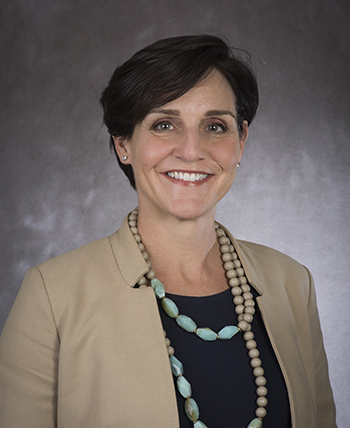
Teresa Schirmer, associate dean of student experience.
This strategy impressed Jillian Ouellette, MSW’24, who worked with McLaughlin to land two internships.
“He was so helpful and kind,” said Ouellette, who recently finished a field placement at Project Bread, a nonprofit that works to address food shortages in Massachusetts. “He thoughtfully got to know me and his other advisees so that he could best understand what experiences we were looking to gain from our field placements.”
Susan Coleman, who’s led the field education program as its assistant dean since 2011, said that her team carefully matches students with field advisors. It was no accident that Ouellette, a macro student specializing in health, was paired with McLaughlin, who primarily works with students on the macro track.
“Students deserve present, focused, and helpful resources,” said Coleman, whose team includes McLaughlin, Elizabeth Casavant, Sarah Hood, Aniruddha Kulkarni, Matthew Orlando, Ximena Soto, and Kenna Sullivan, all of whom help burgeoning social workers navigate field education. “There’s a lot of attention to detail that goes into ensuring that each student has their own kind of individual experience in the matching process.”
Coleman and her team have cultivated relationships with more than 1,000 field agencies in Boston and beyond. But that list is ever-expanding, built in part on the particular needs of their students.
Take Rachel Harris, who emailed Coleman to set up a time to chat about her upcoming internship as she was wrapping up her first year in the MSW program. Harris, MSW’24, was a little nervous about her future.
She was a part-time student who had been working full-time at the Donald McKay K-8 School in East Boston. She loved teaching middle school science to students with learning disabilities and emotional challenges and couldn’t fathom leaving them to start working somewhere else in order to satisfy the requirements of field education.
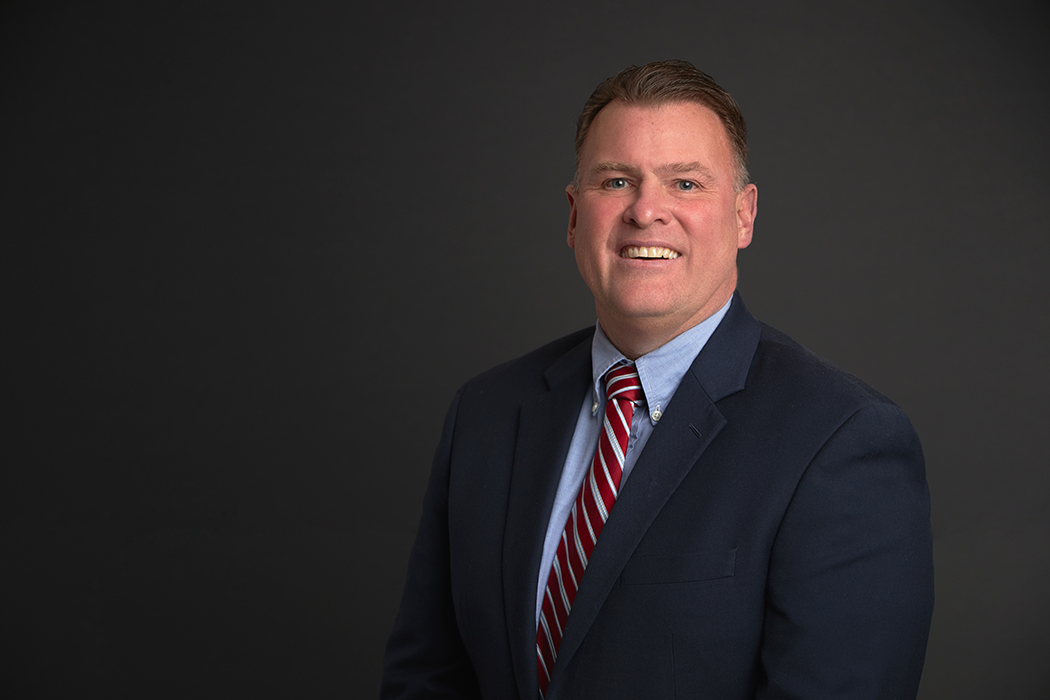
Joseph McLaughlin, assistant director of field education.
Harris asked Coleman whether she could do her internship over the summer so she could keep working at McKay in the fall. Coleman, in turn, suggested Harris look into the possibility of staying at McKay and doing her internship there. Eventually, Harris got the OK from her school, thanks in no small part to Coleman’s advice.
“Honestly, the idea hadn’t really occurred to me, and then she really encouraged me to look into it,” said Harris. “Her flexibility about the idea and encouraging me allowed me to meet a supervisor who taught me so much and was so supportive to me in my social work practice.”
Harris’s relationship with Coleman exemplified her experience with staff throughout BCSSW. “Every staff member that I met seemed very open toward all the students, and I think that’s really nice and special,” she said. “You don’t have to wait for an opening— all of their doors are metaphorically open all the time.”
Schirmer’s reach extends beyond the walls of her office in McGuinn Hall. She hosts an annual, off-campus retreat for incoming students, teaches a section of Basic Skill in Clinical Practice, and advises the Student Collective, which oversees nine student groups and committees dedicated to promoting acceptance and inclusion.
It’s all part of her never-ending effort to have her finger on the pulse of the student population. “We want to make sure that we hear people, that we listen to what they’re saying, and that we’re open to their feedback as well,” she said.
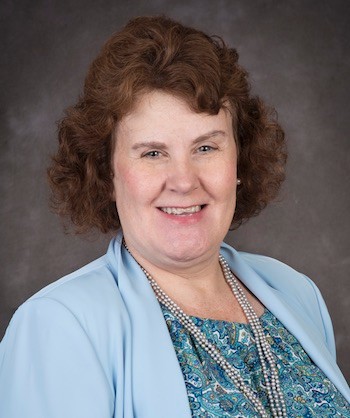
Susan Coleman, assistant dean of field education.
Although Ouellette studied macro social work, she took Schirmer’s section of Basic Skills in Clinical Practice and loved it. Then, after building a strong relationship with Schirmer in class, Ouellette reached out to her teacher for help securing a position as a graduate assistant in another department on campus.
“She treated the students in the class with a great deal of respect and understanding, and you can see how that translates into her work with all students as the associate dean of student experience,” said Ouellette. “Her door is often open, and she welcomes anyone into her office to hear what is going on with them and to hopefully point them in the right direction if they need assistance in any way.”
Cindy Snell, director of Career Services and Alumni Relations, plays a major role in preparing students for professional success. Her Career Services office, supported by a dedicated staff committed to lifelong professional development, makes it easy for students to tap into a huge jobs database, connect with potential employers, polish their resumes, participate in mock interviews, attend annual recruitment fairs, and more.
Starting at orientation, Snell encourages students to schedule appointments with Career Services to talk about how they can use resources, the curriculum, and their field education experiences to pinpoint their professional goals.
“Sometimes it’s having conversations to tease out what issues are important to them, what roles they want to play, and what geographic location they’re looking for,” says Snell, who recently created a comprehensive guide to navigating the career process. “We help guide them, either by connecting them with alums they can have informational interviews with or encouraging them to participate in some of our career exploration events.”
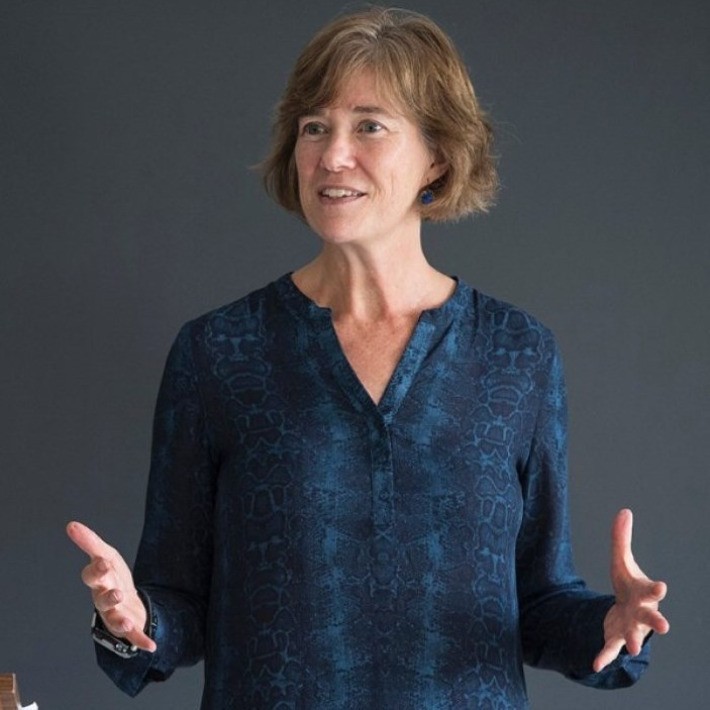
Cindy Snell, director of Careers Services and Alumni Relations.
Her office routinely responds to the specific needs of students through specialized programming. On one occasion, a final-year student said that she didn’t know much about workplace benefits and would welcome a workshop on what a typical job offer provides.
Snell connected with an alumnus, now the vice president of a large human services agency, and created an online workshop in which the graduate walked participants through typical benefits, discussed salary negotiations, and outlined career opportunities at his agency.
“I really like creating programs and responding to what students need at any given time,” said Snell. “I think that ability to be creative and pull in alums who might be informative to students is my favorite part of my job.”
Snell, Schirmer, Coleman, and their colleagues said that they meet regularly to address the needs of students. It is with a deep sense of empathy and compassion that they go to work each day, hoping to ensure that every one of the nearly 600 MSW students at BC are well-positioned to reach their professional goals.
“I want students to feel like we’ve got them, that there’s a safety net for them here,” said Coleman. “And if I don’t know the answer to something a student asks, I know someone else knows it, and I will make sure those connections happen. We all feel like we share that responsibility.”
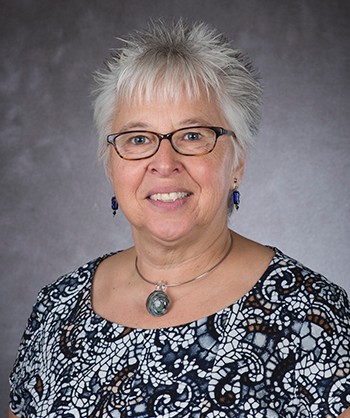
Liz Cinquino, director of student services and advising
Jamelia Willock, MSW’24, leaned heavily on Coleman throughout her stint in the part-time MSW program, especially during her first year in the program in fall 2021.
Willock was still working full time when she enrolled at BCSSW, she recalled, and worried that she wouldn’t be able to complete her field education without quitting her job. But Coleman assuaged her fears and guided her through the process of landing her first internship, a position as a clinical social worker at a mental health practice called Activated by Wellness.
“Sue sat with me, told me about opportunities to be creative with funding for field practicums, and pointed me to other avenues I didn’t know existed,” said Willock. “She provided me encouragement when I doubted myself, made me aware of opportunities that I may be a fit for, and sometimes just listened and offered support when I needed it most.”
Willock credited Liz Cinquino, director of student services and advising, with helping her map out a course schedule that fit into her life and her budget.
“Liz, a master of her craft, took her time and went over the three-year track schedule with me, which brought me a sense of ease and assurance that I was off to a great start,” said Willock. “I checked back in with her almost every semester and, while I’m sure she had a million things to do, she always provided a graceful and timely response to my questions.”
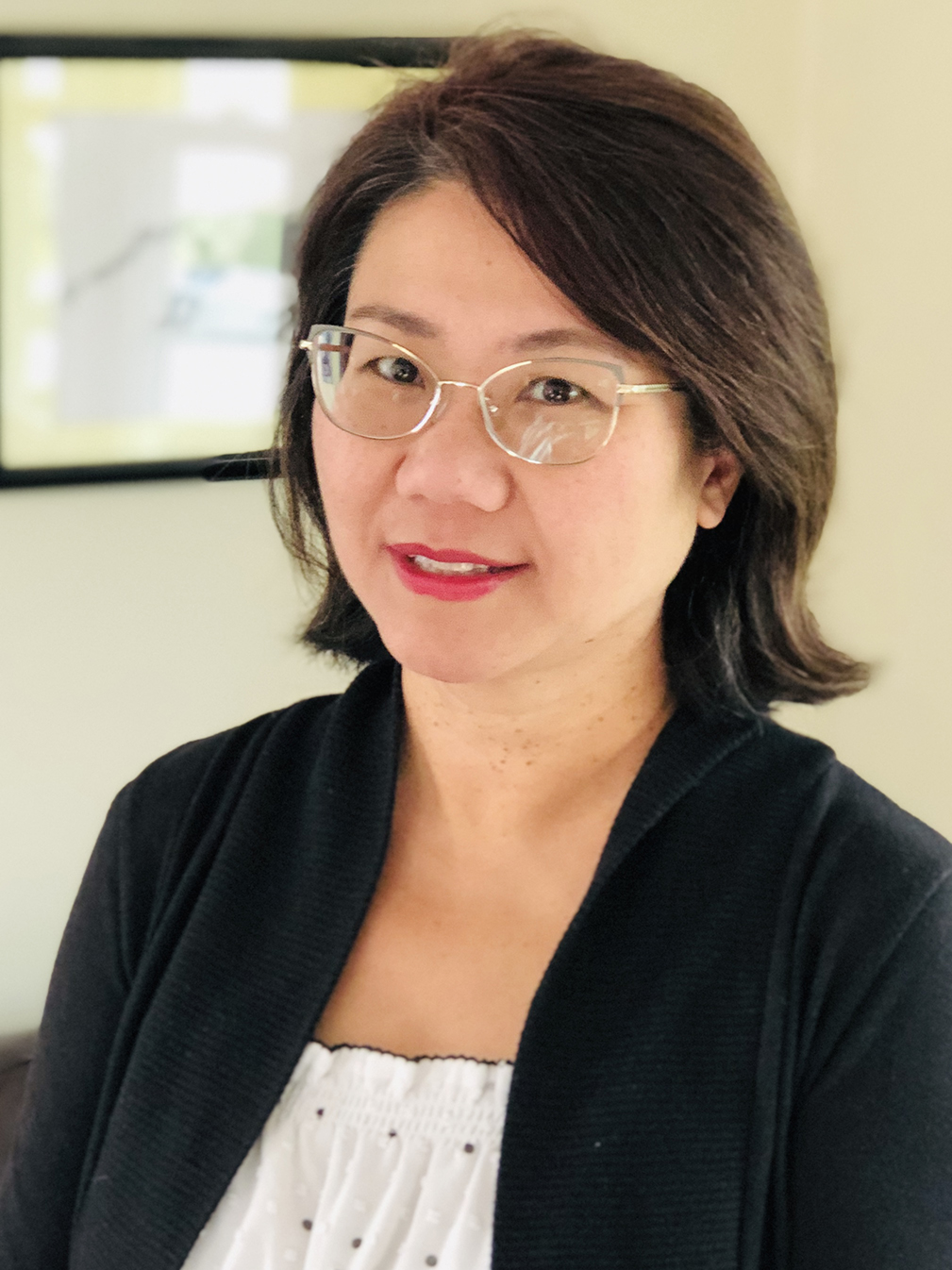
Nicole Ng, academic support assistant.
Willock urged new students to find one or two staff members who they can depend on during their journeys through the MSW program. For her, they were Coleman and Cinquino.
“Having Sue in my corner was one of the most instrumental pieces to my success as a student,” said Willock. Of Cinquino, she said: “Liz was a wealth of knowledge in navigating BCSSW and if she didn’t have the answer to a question I had, she knew who to go to.”
Many students rely on Nicole Ng, an academic support assistant. Ng does a lot of work behind the scenes, planning events, updating the MSW Handbook, and formatting syllabi. But she also sets up testing accommodations for students; proctors exams; ensures that global practice students have what they need to work overseas; and handles the logistics for three travel courses.
Ng routinely gets thank you notes from students who participate in these courses and even received a Frida Kahlo fridge magnet from one group that visited the U.S.-Mexico border in Arizona.
“I feel like I’ve touched every part of the School,” said Ng. “In big and little ways, I help a lot of different people support the students.”
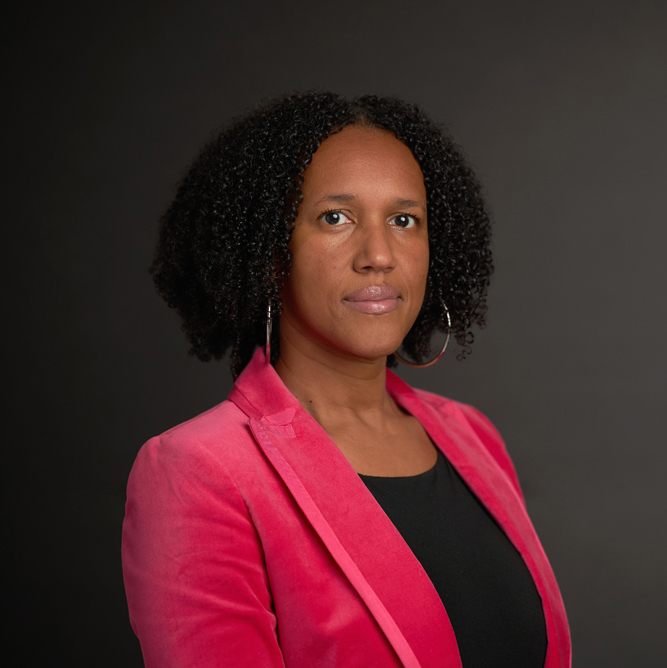
Paula Coutinho, associate dean of enrollment management
Unlike Ng, Paula Coutinho doesn’t work directly with students once they’ve enrolled at BCSSW. But she does play a crucial role in ensuring that the students who come to the School are set up for success from Day 1.
As the associate dean of enrollment management, Coutinho regularly organizes info sessions in which prospective students learn about the benefits of a BCSSW education from current students. She’s instrumental in setting up meetings between prospective students and the founding directors of the Latinx Leadership Initiative and the Black Leadership Initiative, two cohort-based programs that train students to address challenges facing the Latinx and Black communities. And she’s always ready to give prospective students copies of a detailed guide for financing their graduate degree at BC.
“I really believe in this program. I had a wonderful experience here as a student, and I hope that prospective students can see that it’s centered around their success,” said Coutinho, BA’99, MSW’03, whose efforts are supported by Assistant Director Corina Bourantas and Admissions Assistant Sarah Lepsevich. “My ultimate goal is for them to see that they will belong here and that we’re rooting for them.”
Small wonder that her favorite part of her job is meeting with prospective students. “I have the privilege of answering their questions and reassuring them that BCSSW would be a great fit for them in so many ways,” she said.


